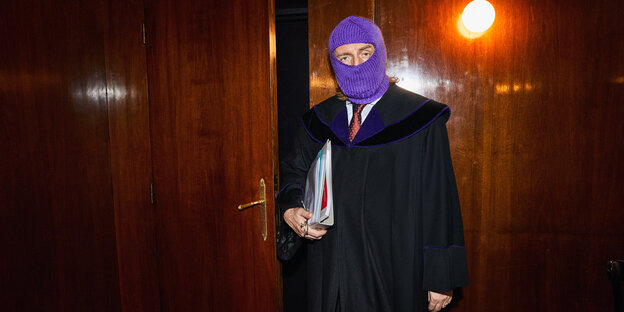The Wiener Festwochen puts right-wing populists before the theater court. The FPÖ is a danger to democracy, but there should be no sanctions.
Litigation with a balaclava during the Viennese Festival Weeks Photo: Photo: Rafaela Pröll
For more than five weeks, the Wiener Festwochen and its director Milo Rau have declared the “Free Republic of Vienna” as a state within a state with its own national anthem, colorful children’s flags, committees, rituals and even its own jurisdiction. Parallel to the conventional performance program, sovereign institutions and regalia double into a parable in the superstructure of a baroque world theater expanded by the media.
Rau’s sometimes carnivalesque metastaging plays virtuoso on the keyboard of a crisis of representation. The introduction of reality into the theater still causes confusion. The claim that an activist art practice can achieve direct political effects becomes in itself a theatrical coup.
The Viennese audience reliably plays along. As soon as there was talk that the world was due a revolution, given the deplorable state it had found itself in, voices from the right muttered about what left-wing things were being done with taxpayers’ money and happily grabbed the sweet treat of an oral meeting. vaccination , which fundamentally immunizes the entire company – also against other possible forms of criticism, for whom the “Free Republic” may not seem so funny or rather too funny.
Confrontation as catharsis
The new Jacobins of Vienna are thoroughly mild contemporaries. They don’t turn heads. The legal dramaturgy in the theater of the ‘Vienna Trials’ is intended to moderate public language and convert the exchange of standing sentences into an exchange of arguments.
Extensive right-wing populists suddenly become very quiet when they are directly confronted with the life story of a refugee. It is about the oldest effect of theater: catharsis. In an exemplary way, it could help to get deliberative processes back on track in reality.
On the weekend of the European elections, the right-wing populist Freedom Party of Austria (FPÖ) was accused of “attacks on democracy”.
Three topics were discussed in three rounds of meetings: the history of the FPÖ and its predecessor as a gathering place for high-ranking Nazis in the first post-war years, the threat to democracy caused by a renewed radicalization of the FPÖ, its leader, ex-Minister of the Interior Herbert Kickl, who sees himself as the ‘People’s Chancellor’, rants about wanted lists for obnoxious opponents, thought experiments of ‘remigration’ are nothing new here, after all the current scandals are nothing new, the willingness in the Ibiza video to sell half the republic for political influencethe connection of top politicians with Putin’s party, but also the espionage scandal under the responsibility of the FPÖ, which, probably partly orchestrated by the fugitive Jan Marsalek, paralyzed the Austrian Office for the Protection of the Constitution for months.
All of this has been dealt with largely in terms of contemporary history, journalism and law. Viennese lawyer Alfred Noll, who acted as “chief prosecutor” in the trials, required considerable patience just to list the “previous criminal records” of legally convicted FPÖ officials and elected officials.
Lessons from National Socialism
What means does Austrian constitutional law have to combat threats to democracy? Surprisingly little. Like the German one Sociologist Heinz Bude explained, the West German Federal Republic and the Republic of Austria had learned very different lessons from National Socialism. The Basic Law considers it a danger that has arisen in democracy.
In Austria, the Nazi era was mainly read in the context of the annexation problem. Measures such as party bans are foreign to the liberal constitutional tradition in Austria. So the prosecutor didn’t even think about it and instead resorted to withdrawing funding from the state parties, which the jury rejected, even though they consider the FPÖ dangerous. The Austrian self-mockery likes to call the pragmatic approach to principles the ‘Austrian solution’.
What remained was the curiosity to see the rightists face to face and see what drives them, at least those who were attracted to such a theatrical tribunal. Invited spin doctors from the FPÖ formulated the general suspicion that everything was just spectacle and manipulation of the public. The once left-wing criticism of the exclusivity of bourgeois high culture becomes a suspicion of a conspiracy story, which does not prevent the conspirators from being in the spotlight.
Time travelers from another era
The FPÖ offered ex-AfD members Frauke Petry and Marcus Pretzell as defenders. They seemed like time travelers from another era, as the rapid radicalization of the AfD had long since overwhelmed them. Petry denounces the organizer as the “Soviet Republic of Vienna”. The old anti-communist right has long been supplanted by a new jurisdiction, for which authoritarianism and disregard for human rights were the least of the things that bothered them about communist rule.
When the former president of the Austrian Judges’ Association, Barbara Helige, opened the closing session with a wooden gavel suitable for television, news was already circulating in the room that the FPÖ had become the strongest party in a national election for the first time. .
Can Austria still be saved? Yes. It is the silent and not so silent heroes who keep the country behind the post-democratic simulation. They also had their say in the process: the MPs who investigated the Commission of Inquiry, the principled Constitutional Protection Officer, courageous journalists, researchers, artists and; the detective who exposed the “Ibiza” scandal.
